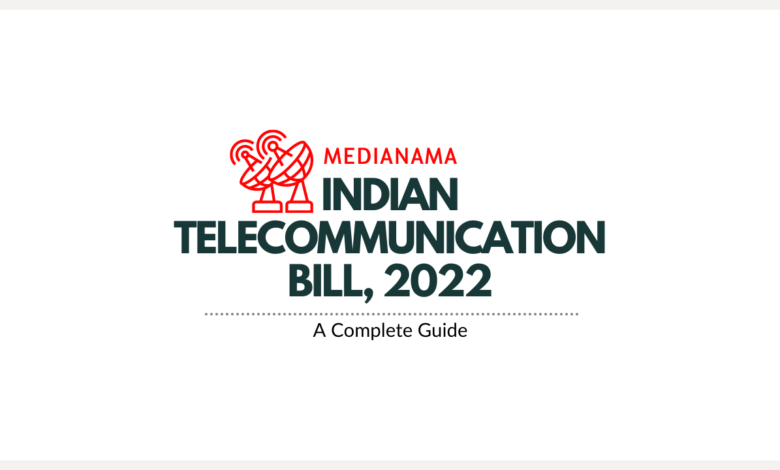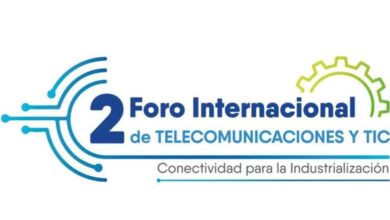What India’s draft Telecommunication Bill 2022 says on licensing, spectrum

The release of the draft of the Indian Telecommunication Bill, 2022 by the Department of Telecommunications (DoT) is in line with the plan to introduce a new legal framework for telecommunications in India. After a consultation paper in July, the Ministry has invited comments on the draft till October 20, to be sent to — naveen.kumar71@gov.in.
Why it matters: Stakeholders have previously called for revisions in the telecom sector’s framework to make it, as the Bill says, “future-ready.” Now this new Bill seeks to replace the existing legal framework governing telecommunication in India, comprising of the Indian Telegraph Act, 1885, the Wireless Telegraphy Act, 1933 and the Telegraph Wires (Unlawful Possession) Act, 1950. This calls for a closer look at the various aspects of this Bill.
Expanded definition for telecommunication services
The bill has expanded the definition* of “telecommunication services” to include “service of any description which is made available to users by telecommunication, and includes any other service that the Central Government may notify to be telecommunication services”.
Description of services provided in the bill: The term ‘service’ will include—
- Broadcasting services,
- Electronic mail,
- Voice mail,
- Voice, video and data communication services,
- Audiotex services,
- Videotex services,
- Fixed and mobile services,
- Internet and broadband services,
- Satellite-based communication services,
- Internet-based communication services,
- In-flight and maritime connectivity services,
- Interpersonal communications services,
- Machine-to-machine communication services,
- Over-the-top (OTT) communication services
It means that internet services like WhatsApp, Zoom, Signal, Messages, Google Duo, etc. will be subject to the provisions of the bill. The Internet Freedom Foundation (IFF) called it one of the “most important” changes made in the bill which will have far-reaching implications on the telecommunication sector in its note discussing various provisions of the bill.
Procedure for licensing, registration, authorisation and assignment
Licensing: Entities seeking to provide telecommunication services and networks will have to obtain a license. However, those already such services or network under current law can continue to operate under its existing terms and conditions till it migrates to a set of new terms and conditions. As per the details in the draft Bill, this provision is to ensure there is no disruption in the sector.
Why is it a cause for concern?
The bill requires every service included in the list of services to obtain a licence to operate in India. The provision is also applicable to internet platforms like WhatsApp and Signal. The IFF argues that it will result in “additional cost and compliance burden for small service providers, and affect the vibrant innovation culture of India.
- Dulls feature richness: The IFF argued that devising regulations to “place regulatory burdens or financial levies on internet platforms and services is not a sound public policy”. It said that it illustrates “reductiveness of a debate that commences from dulling the feature richness and diversity of internet applications and services into the straitjacket of OTT”.
- Cannot be substituted: The IFF disputed the “substitutability of services” between telcos and internet applications. “The latter quite often offer multiple functionalities—which may include voice calling and instant messaging—even though their primary functionality, for instance, may be social networking,” the IFF said.
- It said that nearly all browser-based content and mobile applications can have a communications layer that supports messages, voice, and video with the help of WebRTC. “Will such services also be brought within the regulatory ambit?” the IFF questioned.
- Unfounded argument: “…the ‘same service same rules’ argument used by telcos are unfounded as there are inherent structural differences between telecom and OTT communication service providers,” the IFF said. It added that telecom operators control the underlying broadband access infrastructure, and are gatekeepers to broadband internet access, which is not available to OTT companies.
- Problematic disclosure of identities: The provision ofrequiring every entity with a licence to “unequivocally identify the person to whom it provides services, through a verifiable mode of identification as may be prescribed.” The IFF reasoned that these provisions “strip away the user’s right” to stay anonymous and puts an obligation on service providers to identify, with complete confidence, every user.
- The IFF also questioned the provision of providing the identity of a person sending a message using telecom services to the user receiving such a message without any accountability.
- “Such a broad and excessive requirement, in the absence of a data protection law, fails to prioritise user safety and security,” the IFF said.
- Dilution of TRAI’s powers: The ministry has also diluted the powers of the Telecom Regulatory Authority of India (TRAI) with the Bill, as per the IFF. “For this, they have deleted certain key provisions of the TRAI Act, 1997, under which the government, prior to issuing a licence to a service provider, had to ask TRAI for recommendations
Registration: Meanwhile, entities looking to provide telecommunication infrastructure will only have to obtain a registration. “Telecommunication infrastructure” includes telecommunication lines, posts, telecommunication towers, ducts, conduits, cable corridors, or any civil, electrical, or mechanical infrastructure for telecommunication. The detailed list of such infrastructure can be viewed in Schedule 5 of the Bill.
Further, entities already providing telecommunication infrastructure under existing laws can continue to operate under existing terms and conditions for five years or until they migrate to new terms and conditions.
Authorisation: Similarly, entities will have to obtain an authorisation for possession of wireless equipment. This includes any telecommunication equipment used in wireless communication, including any wireless transmitter capable of broadcasting or emission of wireless communication.
Accordingly, the Bill prohibits possession and use of any equipment like jammers that block telecommunication or are likely to disrupt law and order, unless it is authorized by the Centre.
To “prevent cyber frauds,” the Bill states that any entity granted license under this “Act shall identify the persons to whom it provides the services through a verifiable mode of identification.” The identity of the person sending a message shall be available to a user as well, says the Bill.
Breach of terms can lead to license suspension: As per the Bill, the central government can take punitive actions against the licensee, registered entity or assignee in case terms and conditions of a license, registration, authorization or assignment granted are breached. These penalties can include suspension, revocation, curtailment of the duration of the license, imposition of financial penalties, directions to entity, etc.
“The Bill recognizes that there is no one-size-fits-all approach, and the intent and willingness of the licensee, assignee or registered entity to remedy any breach, should be adequately considered before taking punitive actions,” says the explanatory note of the Bill.
Unverified users may face imprisonment: As per Schedule 3 on penalties and offences, a person availing telecommunication services, including OTT, can be imprisoned for upto one year or fined ₹ 50,000 or both if they misrepresent their identity as “required under sub-section 7, Section 4.” This means that any person using OTT services like WhatsApp, etc. will have to provide verified documents of their identity if they want to avoid a cognisable offence. Offenders may also have their service suspended along with other penalties.
Similar penalties will be levied on entities providing telecommunication services or network without a license under subsection (1) of Section 4 or gaining/ attempting to gain (a) unauthorized access to a telecommunication network or (b) intercepting a message unlawfully.
Further the schedule states a penalty of ₹ 25,000 if any provision is contravened. While it will a non-cognisable offence, subsequent offences will result in fines up to ₹ 50,000 for every day after the first during which the contravention will continue.
Voluntary undertaking to help address breaches: The department in its explanatory note claimed that a framework for voluntary undertakings can provide “significant relief” for the telecom ecosystem. This is a mechanism that allows a licensee, registered entity, or assignee to submit an undertaking to address any breach of terms and conditions. The document will include:
- An undertaking to take specified remedial actions
- An undertaking to refrain from taking some actions
- An undertaking to publicise the voluntary undertaking
If this document is accepted by the Centre, then there will be no proceedings against the licensee, registered entity or assignee. However, failure to comply with such a voluntary undertaking, will result in penalties as specified.
Bill calls for optimum use of spectrum
The draft Bill suggests an explicit statutory framework and clear regulations for the Centre to undertake spectrum assignment, as opposed to the current method involving a combination of government policies and judicial decisions. It states that assignment of spectrum can be done primarily through auction.
“For certain specified functions relating to government and public interest like defence, transportation, research, etc. the Bill provides an enabling framework for assignment of spectrum through administrative process,” says the explanatory note to the Bill.
Provisions for an ‘enabling environment’: The Bill specifies four provisions for “optimal utilization of spectrum.” It calls for “technology agnostic use” for a liberalized and technologically neutral usage of the spectrum. Further, it says a spectrum assignee “may deploy new technologies within its spectrum.”
Another provision, “re-farming and re-purposing”, suggests rearrangement of any frequency range to enable repurposing for a different use. The Bill also suggests sharing, trading, leasing, and surrender of spectrum assigned, while considering prescribed terms and conditions. Moreover, the Bill provides a procedure to return unutilised spectrum.
Provisions for policy continuity: Like in the case of licensing, registration, authorisation and assignment, the Bill lays down provisions for spectrum-related policy continuity. They are as follows:
“(a) Existing spectrum assigned through auction will continue till the duration of such assignment.
(b) Existing spectrum assigned through the administrative process shall continue to be valid on the terms and conditions on which it had been assigned, for a period of five years from the day the Bill comes into force, or the date of expiry of such assignment, whichever is earlier.
(c) Exemptions relating to spectrum usages at the date of enactment of the new law would also continue. The Bill provides flexibility for any exemptions that the Central Government may grant on spectrum usage, in the public interest.”
This is in line with the consultation paper published by the department previously.
*Disclaimer: The post was updated on September 23, 2022, at 16:35 to include IFF’s observations on the bill and then on September 30, 2022 at 3:58 PM for more information on penalties and offences.
Also Read:



